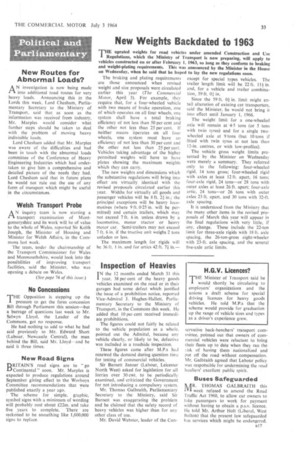Inspection of Heavies
Page 35

If you've noticed an error in this article please click here to report it so we can fix it.
IN the 12 months ended March 31 this year, 38 per cent of the heavy goods vehicles examined on the road or in their garages had some defect which justified the issue of a prohibition notice, reported Vice-Admiral J. Hughes-Hallett, Parliamentary Secretary to the Ministry of Transport, in the Commons this week. He added that 10 per cent received immediate prohibitions.
The figures could not fairly be related to the vehicle population as a whole, pointed out the Admiral, because any vehicle clearly, or likely to be, defective was included in a roadside inspection.
These figures came after M.P.s had renewed the demand during question time for testing of commercial vehicles.
Sir Barnett Janner (Labour, Leicester North West) asked for legislation for all lorries over 30 cwt. to be periodically examined, and criticized the Government for not introducing a compulsory system.
Mr. Thomas Galbraith, Parliamentary Secretary to the Ministry, said Sir Barnett was exaggerating the problem and he claimed that the safety record of heavy vehicles was higher than for any other class of use.
Mr. David Webster, leader of the Con
servative back-benchers' transport committee, pointed out that owners of commercial vehicles were reluctant to bring their fleets up to date when they ran the risk of having them nationalized and put off the road without compensation. Mr. Galbtaith agreed that Labour policy was respohsible for undermining the road hauliers' excellent public spirit.
ik AR. THOMAS GALBRAITH this al week refused to amend the Road Traffic Act 1960, to allow car owners to take passengers to work for payment without having to obtain a p.s.v. licence. He told Mr, Arthur Holt (Liberal, West Bolton) that the present law safeguarded bus services which might be endangered,












































































































































